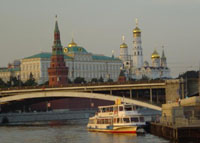Russians credit Putin, but criticize the quality of power
People want the power in Russia to be the powerful state management

Each nation of the world has its own specific attitude to the question of the 'perfect government.' As for Russia, Russians still do not know how to choose the best way to rule the world's largest country – whether the principles of statesmanship should be based on the law or conscience. This question was reflected in the recent research work made by the group of specialists from the All-Russian Opinion Poll Center. Experts polled about 1,600 respondents from 104 Russian settlements. 
When people were asked a question about the incarnation of the present-day state power in Russia, the majority of respondents (43 percent) said that they perceived President Putin as the central subject of power in the country. Eight percent believe that the power in Russia belongs to oligarchs, five percent named the Russian parliament, whereas four percent of the polled stated that they thought of the power as something closely connected with bureaucracy and criminality.
Russian people's perception of the most relevant qualities of the perfect power was distributed as follows. “Taking care of the people” took the first place on the list of priorities for the Russian government, followed with “justice,” “lawfulness,” “honesty,” and “the absence of corruption.” The opinion poll showed that Russians do not think that the power in Russia should be democratic: this quality ranked only 14th being preceded with “determination” and “authority.” Specialists of the above-mentioned Center said that many Russians associate the democratic quality of power with lawlessness and permissiveness. “Kindness,” “modern spirit” and “openness” were named as “the least important qualities that the Russian administration should have.
The poll revealed that Russian people's structure to perceive the qualities of power was rather primitive. Apparently, Russians still do not know how state officials should rule the nation: either on the base of justice or law (whether they should be professional managers or caring fathers, so to speak). Financially secure and young Russians take the side of the first of the two options, whereas elderly citizens share a different approach on the matter.
The majority of Russians believe that one should toughen responsibilities for state officials and strengthen people's control over their actions. Many acknowledged that raising salaries for officials was an absolutely inefficient way to improve the work of the Russian government. About 57 percent of the polled said that only educated and intelligent individuals can hold the reins of government. Only 33 percent of respondents said that state officials should have the common-life-experience in their lives so that they should be perfectly aware of people's problems and needs.
As a matter of fact, Russians do not expect any qualitative changes in the structure of the Russian state power during the forthcoming five years. The majority of respondents said that they do not expect the Russian government to obtain more moral principles in the future. Positive expectations are presumably linked with determination, education, competence, stability, strength, activity and foresight.
”People want the power to be the powerful state management,” the chairman of Russia's Federation Council, Sergei Mironov said.
A lot of Russians have a negative attitude to local governments, associating them with corruption, irresponsibility and poor authority.
”The quality of the Russian elite has obviously been improving lately. All officials, who take the leading state positions in the country, are educated and intelligent individuals, a spokeswoman for the Institute of Sociology, Olga Kryshtanovskaya said. However, opinion polls show that the quality of power in Russia will improve a lot more if state officials raise their professional, educational and cultural level.
Subscribe to Pravda.Ru Telegram channel, Facebook, RSS!


